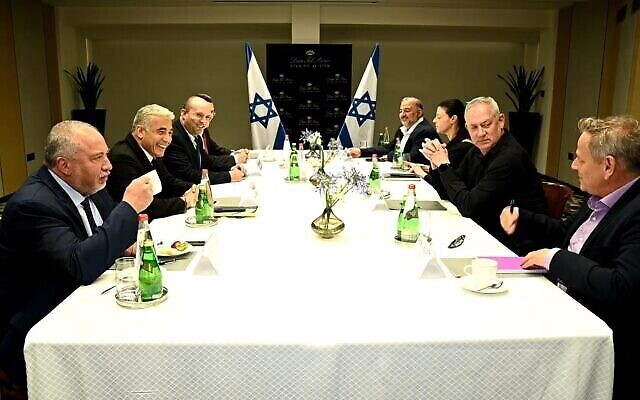After two years and a half of political crisis and four elections that have all ended in Netanyahu’s failure to form a right wing government, Yair Lapid succeeded in obtaining the consent of 61 deputees in order to form a coalition from the Meretz on the left to Yamina on the right which, for the first time since 1948, will have the support of an Arab party, the Islamist party Raam.
On the eve of the swearing-in of this change government —or union governement, depending on the designations—the tension is strong in the country and among politicians : many electors coming from the eight parties that constitute this future majority fear a last ploy of Netanyahu’s to prevent its establishment. It is probably the image that will leave to history the unscrupulous man, always ready to compromise in order to stay in power, who will remain as the longest-serving of all Israeli Prime Ministers.
The coalition agreements, negotiated till the last minute, have all been published. A first framework agreement signed by Yair Lapid and Naphtali Bennett defines the main orientations of that government, and assigns to each of them in turn the position of Prime Minister : Bennett first, while Lapid will be Minister for Foreign Affairs, both of them exchanging positions at mid-term. Then Lapid signed agreements with each party of the coalition, assigning them portfolios and committing to meeting with their requirements. Each of the party leaders will have veto power, but in case of dispute, the framework agreement will be the most restrictive, and the two leaders will have to make the decision.
All observers have noted the contradictions inherent to the parties belonging to that coalition. They have aldready identified the problems that may arise in the next weeks, compromising its future. However, the leaders of those eight parties say that they all share the same will to restart a country already paralyzed for two years and a half. They are determined to take charge of the numerous problems of the population’s everyday life. There is a good deal of work to do : health for a start ; the success of the campaign of vaccination has masked the decay of a system on the brink of collapse—the annual health expenditure per person amounts to 3000$ per person in Israel while in France, it amounts to the double ; transportation : the absence for years now of a policy of public transportation leads to an everyday paralysis of the whole country ; education : the differences of teaching programs and means between the four systems that coexist, each of them addressing one of the four tribes forming the nation, such as President Rivlin identified them—secular, Orthodox, national religious, Arab—have consequences on the overall level of students that has decreased significantly these last years ; employment : it is necessary to implement return-to-work programs following the explosion of bankruptcies (100000) and of unemployment (500000 unemployed persons during the crisis) caused by the pandemic ; the social conditions : the consecutive governments, mostly from the right wing, with a halving of expenditures for social welfare in twenty years, caused the impoverishment of two million people or so ; the violence and the small-scale crime in Arab cities and villages, with several dozens of murders a year that participated in the explosion of inter-communal riots last month… The list of projects to launch is still long !
But in addition to that agenda, which will keep this new government quite busy, we shall note two main characteristics that will be a turning point in the country’s story. First of all, the presence of Arab ministers among its members is a true revolution that will remain an acquis. The Arabs see their legitimity recognized and are able to enter the political scene of the country, after having moved up the ladder to it through their work and their academic achievements.
Finally, the common denominator of the participants to this government is their will to turn the page following the Netanyahu years, with the verbal and sometimes physical abuse that characterized them. They all hope to try and pacify the public debate, not considering any more their opponents like traitors or enemies, as it happened so often these last years, and to allow the Israeli society to find again the cohesion it had in the old days. This is probably the major challenge of that government which, considering the divergences of opinions between its participants on the policy to be pursued towards the Palestinians, will probably face these issues with a total inertia.
But if that government succeeds in ending the quasi-“civil war“ (verbal for the time being) existing in this country, it will undoubtedly achieve its most important task. It is only by restoring a calmer internal debate and by reinstating a mutual respect that the country will be able to recover the self-confidence and the strength necessary to face the challenges ahead.






